Inglourious Basterds
 for strong graphic violence, language and brief sexuality.
for strong graphic violence, language and brief sexuality.
Reviewed by: Daniel Thompson
CONTRIBUTOR
| Moral Rating: | Extremely Offensive |
| Moviemaking Quality: |
|
| Primary Audience: | Adults |
| Genre: | War Action Adventure Drama Adaptation |
| Length: | 2 hr. 35 min. |
| Year of Release: | 2009 |
| USA Release: |
August 21, 2009 (wide—3,000 theaters) DVD: December 15, 2009 |
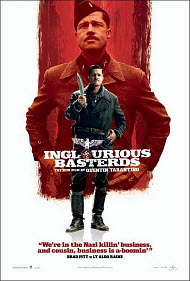

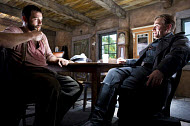
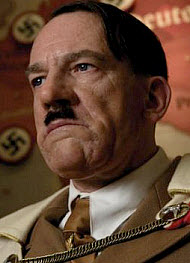
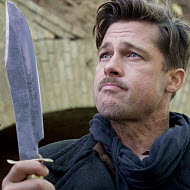
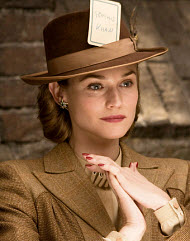
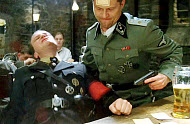

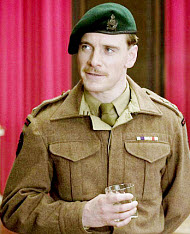
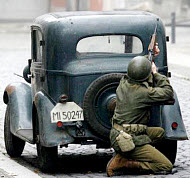
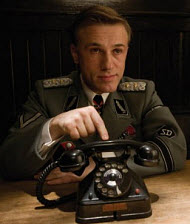
| Featuring |
|---|
|
Brad Pitt Diane Kruger Mike Myers Eli Roth Samuel L. Jackson (Narrator) Mélanie Laurent Christoph Waltz Michael Fassbender Daniel Brühl Til Schweiger See all » |
| Director |
|
Quentin Tarantino |
| Producer |
| The Weinstein Company, Universal Pictures, See all » |
| Distributor |
“An inglorious, uproarious thrill-ride of vengeance”
Do you ever wish a major historical event turned out differently? Looking back at all the big happenings throughout modern world history, it’s sometimes interesting to think how massively different the world would look if one specific occurrence was altered or completely erased. Well, it’s in this mindset that we get the revisionist history of “Inglorious Basterds,” Quentin Tarantino’s latest effort that details, among other things, the fictional account of the Basterds, a group of Jewish-American soldiers in the 1940’s sent into Germany occupied France to strike fear into the Third Reich by taking justice into their own hands: killing Nazis and asking questions later, carving their way straight to the Fuhrer himself Adolf Hitler. The result is a sometimes witty, but often bloody and profane film that is the very definition of (excuse the pun) pulp fiction.
To understand what to expect from “Inglorious Basterds,” one must first understand what to expect from any movie written and directed by Quentin Tarantino. Tarantino films always have a distinct feel to them, which is probably the reason that the director has a legion of diehard fans. While Quentin is undoubtedly an excellent writer, this reviewer has always found his work to be inconsistent, at best. He seems to be so in love with the dialogue he’s written that he wants every punch line and witty remark to be taken in all their glory. He feels that if andy scene is cut, the viewer will miss out on his pure genius. He changes pace quite regularly, going from nail biting suspense to a dead crawl in an instant.
Also, Tarantino seems to be in love with shock value, looking to give the moviegoer a reason to turn his or her head away from the screen. While he clearly has an abundance of movie knowledge, Tarantino films also come with many quirks specifically in the narrations and soundtracks to his films. These quirks usually don’t even remotely fit into the framework provided for the story. And while fans would say that’s just “Classic Quentin,” I’d say it’s just poor film making.
While “Basterds” is far more entertaining than any of his recent work, it still suffers from some of the same problems mentioned above. There are many occasions where the movie seems stuck in slow motion. Clocking in at 155 minutes, “Basterds” could’ve been a much better film with about 30 to 40 minutes of good editing. The language is rough, and the violence is also graphic, with shootings, beatings, as well as the Basterds scalping Nazis after they kill them.
Having said all of that, there are some classic moments in “Inglorious Basterds”. Sometimes the movie just comes together well. Various scenes, specifically the first and last of the film, come alive with suspense and intensity that make them downright enjoyable. The cast is first rate, as well, and while everyone is great in the film (including Mike Meyers in a one scene cameo) two performances stand out. The first is Brad Pitt as Lt. Aldo Raine, the leader of the Basterds. Pitt plays Raine with such a great Southern dialect, as well as hysterical facial expressions and mannerisms. The other impressive performance is from Christoph Waltz as the menacing Nazi Colonel Hans Landa. Waltz, who has never been in an American film, is fluent in French, German, English, and Italian. As the antagonist known as ‘The Jew Hunter,’ Waltz showcases all four of these languages and does so in such an impressive fashion that he easily steals every scene he’s in.
While “Inglorious Basterds” is ruthless and mostly just meant for surface level entertainment, it does speak, possibly unintentionally, to the depravity of man. During the film, it’s easy to begin rooting for the Basterds as they scalp Nazis and attempt to kill Hitler. You find yourself justifying their actions because you know how it actually turned out. You start secretly cheering like it’s a sporting event. It’s a strong commentary on why humans are incapable of delivering ultimate justice: because we to are inherently fallen and sinful, just as the killers in the film. It’s a securing thought to know that we’ve been saved by grace from our fallen state. We don’t have to change history to feel as if justified, because it’s not on our shoulders to dispense justice, but on the one who has saved us. And that’s as glorious as it gets.
Violence: Extreme / Profanity: Extreme / Sex/Nudity: Heavy
See list of Relevant Issues—questions-and-answers.


Negative—This comment is for Steven Adam Renkovish, age 27 If you read my comment you would probably be aware that I have seen many “R” films, as I openly mentioned seeing “District 9” and enjoying it. The complaints I (and others) put forth about this film are valid. Unlike some rated “R” films billed “genius”—District 9, The Killing Fields, El laberinto del fauno and even (practically rated X) Lust, Caution etc.--there was NO overall point, reasoning or even plot needed essence to the violence depicted in this film. Some critics have even referred to it as a “masterpiece.” Impressive, considering the company it keeps with other films billed as such, “Casablanca”, “Lord of the Rings” etc.
This film depecticted torture for “humors sake” and that was all. If that is why you went to see this film--because torture is “funny”—then sure, go see it. For the rest of us it came off as a vile, shamless RIP-OFF of “To Be or Not to Be” with Carol Lombard and Jack Benny. Except one vital exception--Ernst Lubitsch was able to pull off a “revenge-comedy” about WWII without scalping and baseball torture. Spare me your reasoning, “if it was rated “R” then you shouldn’t complain”—there are wonderful “R” films and poo. And this one is poo.
Moral rating: Extremely Offensive / Moviemaking quality: 3½
And, as Pedroia points out in her well-written and intelligent comment, Tarantino: “only a poor filmmaker would come and say exactly what he wants you to take away from a film. Film is a visual medium and the directors goal is to show, not tell.” This is correct. Yes, there are some things a good director WILL tell. But there is always more below the surface, and there is in this movie. It is not violence for the sake of violence. Just because a movie lingers on the gore does not mean it is gratuitous or cruel; after all, many movies linger on crying faces and haunting expressions and nobody calls that gratuitous. In fact, this film presents a great moral quandary: Lieutenant Aldo Raine’s (Brad Pitt) team who calls themselves the “Inglorious Basterds” are perpetrating the same violence against Nazis that Nazis did against Jews in real life. See all »
Moral rating: Extremely Offensive / Moviemaking quality: 5
1. There is no nudity. Not even close.
2. I read one comment about “graphic sex scenes”. There is one sex scene that lasts for literally TWO SECONDS. There is no nudity. The film in its entirety is about an two and a half hours. I think most adults can handle two seconds out of 153 minutes. I have seen more sexual material in PG films than this one.
3. There is no scalping of anyone alive. There are a few brief images of scalps being removed from dead people.
4. The most disturbing scene is a man being beaten with a baseball bat, but it is brief and most of hit happens from a distance. Plus, it is telegraphed so you can easily look away.
5. There are some f-words, but not non-stop like in a lot of R-rated movies such as “District 9,” “Funny People,” or previous Tarantino efforts. The language is about average for an R-rated film.
While this movie is not for everyone, it is leaps and bounds ahead of most movies in terms of dialogue, scene construction, tension, and just cinematic excellence. It is also not nearly as offensive as Tarantino’s “Pulp Fiction,” “Kill Bill Vol. 1,” “Jackie Brown,” and especially “Reservoir Dogs” in terms of language and violence. The screening I saw it at had a lot of older people (50+) and there was applause at the end of the screening. The general consensus was that we had just walked out on a really unique, very well put together piece of cinema. There are plenty of movies out there that are incredibly offensive in terms of content (“Bruno,” “Funny People,” “Hangover”), but I don’t think this is one of them.
Moral rating: Average / Moviemaking quality: 5
Not only did I rejoice in the triumph of good over clear moral evil, but I was one of those people who was cheering in the end. Apparently the folks that did not like the film had no family members murdered in the Holocaust, and have little understanding of the G-d ordained violence of the Old Testament. The deliberate destruction of evil makes me happy. I don’t buy for one minute that someone who saw the movie “threw up” while watching it. That’s utter and shameless nonsense. The movie isn’t for children, but my 20 year old jewish son loved it as well. BTW, though Jewish I am a follower of the Messiah as is my son. Long live the Inglourious Basterds!!!
Moral rating: Excellent! / Moviemaking quality: 5
Too many people think movies should be made their way and no other. They miss the fact its not about you. Its about the director. They make these movies based on what they want, not you. If you don’t like it fine. But don’t act like a movie is horrible because it wasn’t made to your standards. I am referring to movie making standards not our belief standards. Obviously belief standards are differently and lets face the facts, its hard to find movies that will live up to our belief standards. This movie is offensive to my beliefs but I don’t mind since obviously I am more open. Which I believe in my heart God wants us to be. He doesn’t want us to be bubbled people living as puppets. That just makes us more mocked by society. He wants us to be smart sometimes.
Would you like this movie? Probably not, my point is we need to use be more open if we are to survive. Lastly what disturbs me more is not the movie, but the comments/reviews. Brother judging brother. And worse yet is the fact the people that claim the movie is this or that still seen it anyways knowing full well many things like what was about, what it was rated, who made it and so on.
That’s like seeing a porn shop and saying its horrible, then going in anyways and complaining afterwards. What do you expect? Also I notice a few people picketed this movie near me. Which I found bad because all that does is make people more interested in the movie. Your doing the exact opposite of what you came to do!
Moral rating: Very Offensive / Moviemaking quality: 4½
People who were offended by this truly shouldn’t be. Actually you should be ashamed of yourself for not doing research on it before going into this 3 hour long movie. You should have watched the trailer and taken note that in the scene where Eli Roth bashes a Nazi’s head in with a baseball bat. You should have also taken note that it is a Quentin Tarantino movie. And if you have ever seen any Tarantino movies you should know what to expect.
And this is not a history story. I watched an interview of Tarantino and he explained This is what he thinks would have happened if all of these characters actually existed. It is a true classic Tarantino movie, a lot of dialog and ruthless killing. If you dislike violence and torture. Then I DO NOT recommend this movie for you. If you enjoy a good storyline and acting, then I must recommend it.
Moral rating: Extremely Offensive / Moviemaking quality: 5
Moral rating: Offensive / Moviemaking quality: 5
Moral rating: Offensive / Moviemaking quality: 4
Moral rating: Very Offensive / Moviemaking quality: 4½
What I found most intresting is how well the character of Nazi Colonel Hans Landa was played and how “complete evil” can be so articulate, sweet-talking—and so very deadly. The movie promoted the “joy of Killing”—on both sides.
Moral rating: Very Offensive / Moviemaking quality: 4½
Let’s face it. If we are Christians watching R-rated movies, then we know what we are getting into, so don’t be so shocked at what you see. Don’t go see it if you are going to be bothered and certainly a Tarantino film you should know what to expect. All I can say is, you asked for it, and you got it.
Moral rating: Very Offensive / Moviemaking quality: 5
First, about what is offensive. First, Tarantino movies have swearing, so as always there was swearing and in reality there was not as much as there usually is, with the exception of the one seen where one of the characters was grabbed.
Second, Tarantino movies are known for over the top gore. While this movie was not full of limbless, cut in half bodies it did have some scenes such as people being scalped and a scene of a man having a Swastika knifed into his forehead up close (well and, of course, shooting wounds and other small things).
Lastly, in terms of sex/nudity, there was no nudity, however, there was a brief few second scene of sex where you didn’t see any body body parts but did see the couple still doing it regardless.
So now to the moral side of this movie. This is where its hard to say is it worth seeing because the WW2 subject is VERY touchy depending on who you ask. The “Basterds” were Jews just seeking revenge. Is revenge the best method? Well, not as a christian. And is the torture of the nazis wrong? Well, one could say they are evil men. And we know allies often did do cruel things to Nazis in WW2 in retaliation. It was war. So like I said its a hard thing to really say if this movie is worth seeing. As a christian, I’d say no on one hand. But another part of me says it’s good to see a movie about alternate history where Hitler and the Nazis got what they deserved even though I know full well it goes against things I believe like revenge.
I will say the one thing I did like was how the Nazis would figure out when someone was lying. While the scenes would be often up to 20 minutes long of talking. It was very well thought out. Now, if they could have those scenes in a less brutal movie I’d recommend it probably for christians.
Moral rating: Extremely Offensive / Moviemaking quality: 4
In defense of myself and maybe many others in the theater, when anyone heard me chuckle or laugh, it was never in response to the violence and torture but always to the dialogue of the casts members. Brad Pitt and the German guy who played Landa, did an excellent job in their roles. I was very impressed with their acting and must say that all of the cast did an excellent job. The 2-second sex scene could have been completely left out and I am not quite sure why it was even allowed to remain; it was unnecessary and crude although no nudity was shown.
If I take this movie from a Christian standpoint, then I have to say that none of us, as Christians, should be gracing the theaters for most of the trash that is put out there to include this film. We are wasting the resources God has entrusted us with when we do and filling our minds with corrupt, unholy images. From the perspective of a movie enthusiast, however, I have to say this movie was excellent, but I will not allow my 13 year old son see it.
Moral rating: Extremely Offensive / Moviemaking quality: 4
I disagree that slaughtering German soldiers (and some Nazis) for the sake of all Jews is justifiable. Lt. Aldo Raine (Brad Pitt) is lowering himself to the very level of the Nazis; they didn’t necessarily scalp their victims but they were incredibly brutal. When German soldiers were captured by the Americans and the British, they were more than willing to surrender to them because both sides abided by the Geneva Convention rules on treatment of prisoners of war, unlike the Soviets who either killed German POWs or sent them to the Gulags. Other than that, the movie is very good but it does lack a consistent storyline.
Moral rating: Offensive / Moviemaking quality: 4
Moral rating: Extremely Offensive / Moviemaking quality: 3
A couple of people sitting next to me or closeby got sick and had to leave, one threw up on the seats. I don’t blame them. The bible teaches us to be at peace with one another and tells us to keep our minds and hearts pure before Christ. This movie encourages the exact opposite and beginning from the very title, glorifies murder, rage, lust, revenge, cowardly acts during war, terrorism, and pride.
I think this is a shameful film that needs to be condemned not only by Christians but by all Americans for what it represents. There is nothing at all funny about depicting Americans as a bloodthirsty, brutal people.
Moral rating: Extremely Offensive / Moviemaking quality: 3½
Moral rating: Extremely Offensive / Moviemaking quality: 3
First of all nothing in the movie ever happened, and since it involves historical figures, this makes it completely pointless. However, it does reveal a side of Hollywood that is often overlooked, and that is its amazing ability to “rewrite” history to suit itself. In this case there is a perverse satisfaction watching Hitler be riddled with bullets in a theater balcony and the rest of the Nazi high command burn to death in a fire. But that is as far as this movie ever takes you. And in the end you look at your ticket stub or the DVD box and say… "What in the heck was that about?"
At least Tarantino doesn’t try to hide the fact that he is rewriting history. Unlike his counterparts in Hollywood like Ron Howard in "Nixon/Frost" or “Oliver Stone” in JFK. Or the countless others who rewrite American History into the tale of the evil white man killing Mother Earth. This film is bloody and violent and in the end utterly forgettable. In fact, I can’t remember anything more than the Brad Pitt saying "We’re in the business of killing Nazis… and business is booming." The only problem is the fact that they really didn’t, and nothing ever boomed. So why are we watching this again?
Moral rating: Very Offensive / Moviemaking quality: 3
I found nothing “intriguing” about beating a man to death with a baseball bat and nothing “humorous” about scalping a prisoner of war while he was alive. There was no “genius” to showing men tortured for revenge and no “complexity” involved in depicting crude racial/ethnic jokes. There was no over all point to this film and no redeeming philosophical point to the violence (i.e. “District 9”'s focus on genocide and xenophobia). So it’s now acceptable to torture men during time of war—And then LAUGH about it? Considering what so many groups of people (Jews, African Americans, Native Americans, Muslims in Bosnia etc.) have endured I could not imagine for one second thinking the needless suffering of any human to be “funny”—on film or otherwise.
Moral rating: Extremely Offensive / Moviemaking quality: 3½
Positive—This Comment is meant to be a response to Chris, age 22, and G. Harms, age 35. I in no way intend to demean the two aforementioned commenters, but would like to put forth a short defense of the film in light of their criticisms.
1. Chris mentions the “pointless display of violence”. Now, while Mr. Tarantino did drop out of high school, he is considered by most to be a genius, and as such he seldom does anything “pointless.” I have been critical of Tarantino’s work for years, but must say, he thinks things through. It is entirely possible the director is posing the question: If this sort of brutality was capable of bringing WWII to an end years earlier, would it have been worth it? Keep in mind, countless lives would have been saved by the Basterds actions. Sure they were violent ( I dare say SOME American GIs probably did worse during the war) but the actions of the Bastereds ended the war.
2. Just because a film portrays “murder, rage, lust, revenge, cowardly acts during war, terrorism, and pride” does not mean it “glorifies” it. I can only assume you are making the argument for lust based on one of two scenes. Either the scene in which the Nazi Propaganda officer is represented having sex or the scene in which the young German war hero propositions Soshanna for sex. In either case, I would submit the acts are being used to demonize the Nazis, and are not in anyway glorifying lust. I could go through and make similar such arguments for each of the listed offenses, but for sake of brevity I wont.
3. As far as condemning this film, I suggest you read the book Behind The Screen. Boycotts and the like are extremely ineffective. Many studio execs never even hear about a boycott, and when they do it only confirms for them that you, the boycotter, were/are outside the demographic they marketed the film to in the first place. To G. Harms,
1. To the best of my knowledge, no one is scalped alive in the film. It seems there is a curious lack of screaming if someone is, in fact, scalped alive.
2. If you were not aware, Tarantino has an affinity for black/african american culture. The racist jokes are used here to vilify the Nazi’s and possibly comment on todays Neo-nazi’s. His respect for other races should be evident in that one of the most heroic, patient, even tempered and well respected characters is a man of African descent who is instrumental in the undoing of the Third Reich. Film, especially at the level of Tarantino, is multi-layered and is rarely overt. We should all attempt to watch films with an analytic eye, keeping in mind that only a poor filmmaker would come and say exactly what he wants you to take away from a film. Film is a visual medium and the directors goal is to show, not tell.
Moral rating: Average / Moviemaking quality: 4½
Negative—Comment for Pedroia: “…but the actions of the Bastereds ended the war.” They did? I believe many historians and servicemen would disagree with you. This film also shows Hitler being killed at the end in a fire. Although it may be “very loosely based on” it is far from accurate. “…Just because a film portrays ‘murder, rage, lust, revenge, cowardly acts during war, terrorism, and pride’ does not mean it “glorifies” it…” I never said that. What I did say is that the film attempts to make “humor of torture.” Does it not? Did audience members not laugh when they watched some of those scenes? I have mentioned many films that show “murder, lust, rage, revenge etc.” but they do so with some sort of “point” if not, some kind of Christian overall “moral tale” or perhaps even a lesson/warning. This film does not. It, unfortunately, is not attempting to show history--it is attempting to show humor in violence.
It is a shame really because the film actually began with griping tension with a masterful performance from Christoph Waltz. For a couple of minutes it had the promise of a very interesting tale. “…To the best of my knowledge, no one is scalped alive in the film. It seems there is a curious lack of screaming if someone is, in fact, scalped alive.” Interesting how you paid so close attention to that detail. If my over zealous grammar lead to a misunderstanding of the exact nature of how the fore-mentioned prisoner-of-war was tortured then I apologize in advance. Torture of course, is MUCH funnier when the prisoner is dead. “…We should all attempt to watch films with an analytic eye, keeping in mind that only a poor filmmaker would come and say exactly what he wants you to take away from a film.
Film is a visual medium and the directors goal is to show, not tell…” I have to disagree my friend. There are many wonderful film makers who say exactly what was intended. To assume that they are poor filmmakers for doing so is foolish. Many often over analyze the immature nature of this film, some have even attempted to say that Tarintino was “testing” our own morality to see if we would really laugh at the torture scenes. However, I do not believe that Tarintino is that skilled of an intellectual. At best he tried to rip-off a classic film from 1947 and failed miserably at it. I enjoyed debating this movie with my fellow Christian brothers/sisters but, in final summary it’s interesting the amount of comments geared towards others who don’t like this film rather than the film itself. I think that in itself is telling that the films quality can’t stand on its own.
Moral rating: Extremely Offensive / Moviemaking quality: 3½
Positive—This is a short response to G. Harms, You criticized my comment on the Basterds actions ending the war, saying “They did? I believe many historians and servicemen would disagree with you. This film also shows Hitler being killed at the end in a fire.” I would like to take this opportunity to say that I am well aware of how WWII actually ended. I never claimed that the Basterds actions ended the war in reality, I only suggested that in the context of the film their actions, though violent, ended the war, and that this may be part of what Tarantino is doing with the film. Posing the question “Would this amount of brutality be acceptable in saving thousands of lives?” I would also like to address your assertion the film “is attempting to show humor in violence.”
I think a deeper look at the film would reveal, that though Tarantino may portray violence in a shocking, sometimes, humorous way, he attempts to cause one to question the appropriateness of laughing at these moments. As one sits in a theater watching other Americans laugh as the Basterds beat and killed Nazi’s, Tarantino quietly holds up a mirror to that very audience. He shows a group of Nazis sitting in a theater, watching a violent film, in which, American soldiers are shown dying. He depicts the Nazi’s laughing at the violence. The scene is a dark reflection of what has been going on in the theater up to this point. I stand by my statement that film is a visual medium and that a director’s goal is to show, not tell. Run a search on the words “show, not tell” or “film is a visual medium” and I dare say you will find many sites on writing and film which would support my position. This film is Tarantino’s attempt to do that. The film, has a point, and just because you were offended by some things in the film, does not mean the film was pointless. I think I have demonstrated that though things in the film were disagreeable, they very easily could have served a purpose. Out of curiosity, if you have the chance to answer, what 1947 film did you think Tarantino was trying to ripp off?
Moral rating: Average / Moviemaking quality: 4½
Moral rating: Very Offensive / Moviemaking quality: 4
Moral rating: Offensive / Moviemaking quality: 5
This comment is for Kira Williams, non viewer age 18 Not to invalidate you opinion, but the movie you are begging people not to see has an MPA rating of R, for STRONG GRAPHIC VIOLENCE, LANGUAGE, AND NUDITY. I’m not entirely sure why you were so shocked that a Quentin Tarantino movie, that is rated R for STRONG GRAPHIC VIOLENCE, LANGUAGE, AND NUDITY, was offensive. That is what the R rating is for. It’s been a while since the director put out a movie, and you’re young, so maybe you’re not familiar with his work. I’m not trying to snark or be rude, but if you are a sensitive soul, perhaps you ought not see rated R movies by directors who are infamous for making ultra-violent films. Just saying. To add: There’s a bad word in the title of the movie! That alone should have been a warning.
Moral rating: Extremely Offensive
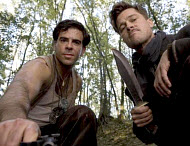
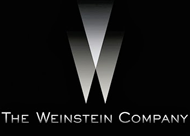
Now, if you go to this movie knowing all of this beforehand, and you STILL come out offended, and proceed to blog on this site with warnings to potential viewers encouraging them to skip this film, you should be ashamed of yourself for two reasons: number one, you knew going in what you were getting yourself into in the first place, and, number two, not everyone thinks the same way that you do, and therefore, may enjoy the film that you are so wholeheartedly persuading them to skip, in which case, you may prevent them from seeing one of the best films of the year.
This film was excellent, and a great time at the movies. Yes, it is sick. Yes, it is disturbing. Yes, it is excessive in every imaginable way. However, the storytelling is top-notch, and the acting is Oscar worthy. It is quite simply one of Tarantino’s best. One of the best tales of revenge to ever grace the silver screen. If you can handle the subject matter, then see it. If not, please heed the warning at the beginning of this review, and avoid this film like the plague. Thanks.
My Ratings: Moral rating: Extremely Offensive / Moviemaking quality: 5